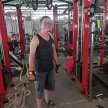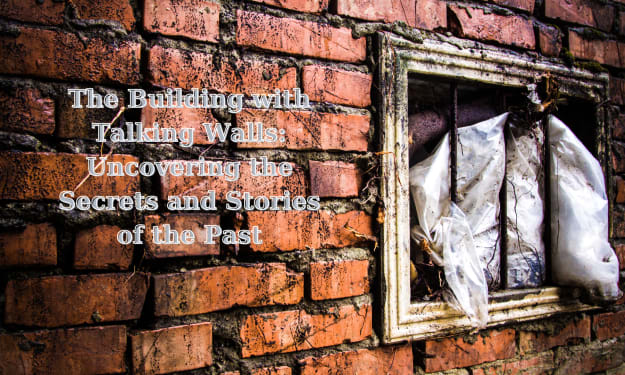The Flu Season: A Lesson in Resilience and Gratitude
Surviving a Severe Case of Pneumonia and Learning to Appreciate the Fragility of Life

It was the middle of downtime, and the flu season was in full swing. In the small city of Greenfield, people were coughing and sneezing far and wide. The original clinic was full of cases seeking treatment for their flu symptoms, and the waiting room was crowded with upset faces. One of the cases was a youthful woman named Sarah. She had been feeling sick for days, and her symptoms were getting worse. She sat huddled in a corner of the waiting room, coughing into a towel and wishing she could just go home and coil up in bed.
As she awaited, she noticed a man across the room who sounded to be gaping at her. He was altitudinous and thin, with a haggard face and a scruffy beard. He looked like he had not slept in days. Sarah felt a shiver run down her chin, and she tried to avoid making eye contact with him. But he kept gaping at her, and she could not help but feel uneasy.
After what felt like hours, Sarah was eventually called back to see the croaker. She scuffled into the examination room, feeling weak and dizzy. The croaker took her temperature and checked her palpitation, and also asked her many questions about her symptoms. He diagnosed her with a severe case of the flu and gave her a tradition for some drugs.
As Sarah made her way back to the waiting room, she felt a hand on her shoulder. She turned around and saw the man who had been gaping at her earlier. He was holding a towel in his hand and had a hopeless look in his eyes.
" Please," he said." I need to see the croaker. I suppose I have the flu too."
Sarah dithered for a moment and also jounced. She could tell that the man was sick, and she did not want to be rude. They both sat down in the waiting room, and Sarah tried to keep her distance from him. But as they awaited, she began to notice commodity strange.
The man was murmuring to himself, and his hands were shaking. He kept coughing and wiping his nose on his sleeve. Sarah could tell that he was getting worse by the nanosecond.
Suddenly, the man stood up and stumbled towards the door." I can not take it presently," he murmured." I need to get out of then."
Sarah watched in horror as he opened the door and stumbled into the hallway. She knew he was putting everyone differently in peril by leaving, but she was too weak to stop him. She just sat there, feeling helpless and spooked.
It was not until the coming day that Sarah realized just how serious the situation was. She woke up feeling indeed worse than ahead. Her throat was sore, and her casket was tight. She plodded to get out of bed and make her way to the restroom. When she looked in the glass, she saw that her face was pale and gaunt.
She knew that she demanded to get back to the clinic, but she did not have the energy to get dressed or indeed call for help. She just lay in bed, soliciting that she'd start to feel more soon.
But the days went by, and Sarah only got worse. Her fever spiked, and she began to have trouble breathing. She knew that she was in serious trouble, but she did not know what to do. She tried to call for help, but her voice was so weak that no one could hear her.
It was not until the third day that someone eventually came to her deliverance. It was the croaker from the clinic, and he'd come to check on her. He set up her lying in bed, slightly conscious and covered in sweat.
" Sarah," he said, shaking her gently." Can you hear me? You need to come with me. You need to go to the sanitarium."
The croaker helped Sarah get dressed and carried her to his auto. She was so weak that she could slightly keep her eyes open, but she could feel the cold air against her face as they drove through the city. She heard the croaker talking to someone on the phone, telling them to prepare a room for her at the sanitarium.
When they arrived, Sarah was wheeled into a room and hooked up to an IV. The croakers and nursers brimmed around her, taking her temperature and covering her vital signs. She felt like she was in a muddle, unfit to completely understand what was passing.
It was not until latterly that day that the croaker came to see her. He explained that she had developed a severe case of pneumonia, a complication of the flu. He said that she was lucky to have made it to the sanitarium in time and that she'd need to stay there for several days to recover.
Sarah was spooked, but she was also thankful to be getting the care that she demanded. She lay in bed, watching the snow fall outside her window, and trying to concentrate on getting better. The days passed sluggishly, but she began to feel stronger with each passing hour.
Eventually, after four days in the sanitarium, the croaker came to see her with some good news. He said that her fever had gone down and that her lungs sounded much better. He told her that she could go home the coming day.
Sarah was overjoyed. She could not stay to be back in her bed, girdled by familiar comforts. She thanked the croaker and the nurses for taking similar good care of her and began to plan her homecoming.
The coming day, Sarah was discharged.
About the Creator
Peter Hill
My ultimate aim is to impart knowledge to the masses and give them insights into the latest trends and developments in this wellness and physical fitness, nutrition, and other correlated domains.






Comments (1)
The flu season is a time when numerous of us are at threat of getting sick. It's memorial that we need to take care of our health and cover ourselves from contagions that can beget serious complications. This story highlights the significance of being visionary in precluding illness, as well as the adaptability and gratefulness that can come from prostrating a delicate experience. Sarah's story is an important memorial that life is fragile and that we should in no way take our health for granted. It shows us that indeed when the effects feel bleak, there's always hope for recovery and a brighter future. By participating in her experience, Sarah helps us all to understand the significance of taking care of our health and appreciating the gift of life. Overall, this story is a great memorial of the adaptability of the mortal spirit and the power of gratefulness in delicate times. It encourages us to take care of ourselves and each other, to be thankful for what we have, and to noway lose a stopgap, indeed in the darkest of times.